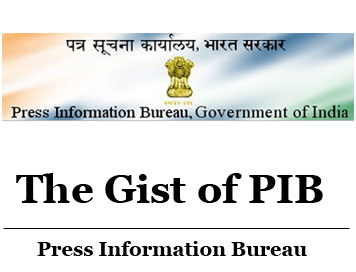The Gist of Press Information Bureau (PIB): January 2016

The Gist of Press Information Bureau: January 2016
- NSCN (K) as terrorist organization under UAPA ()
- Qaumi Ekta Week ()
- IBSA Fund for the Alleviation of Poverty and Hunger ()
- Justice T. S. Thakur as the new Chief Justice of India ()
- Direct subsidy to sugarcane growers (Only For The Subscribed Members)
- Job Oriented Higher Education (Only For The Subscribed Members)
- Beti Bachao-Beti Padhao (Only For The Subscribed Members)
- Ek Bharat Shreshtha Bharat (Only For The Subscribed Members)
- National Mission for Electric Mobility (Only For The Subscribed Members)
- Strategy to deal with Terror Financing and Money Laundering (Only For The Subscribed Members)
- Bharat Fund (Only For The Subscribed Members)
NSCN (K) as terrorist organization under UAPA
The Government has declared the National Socialist Council of Nagaland (Khaplang), NSCN (K), all its formations and front organizations as a terrorist organization under the Unlawful Activities (Prevention) Act, 1967. A Gazette Notification issued on November 6, 2015 mentions that the NSCN (K), a militant outfit, came into existence in 1988 and is active along the Indo-Myanmar border. NSCN (K) has resorted to terrorism by killing innocent civilians and security forces and engaged in other violent activities including the June 4, 2015 attack on the Army convoy in Chandel district of Manipur.
Qaumi Ekta Week
With a view to foster and reinforce the spirit of Communal Harmony, National Integration and pride in vibrant, composite culture and nationhood, the “Qaumi Ekta Week” (National Integration Week) was observed all over the country, from tomorrow to 25th November, 2015. The National Foundation for Communal Harmony (NFCH), an autonomous organisation with the Ministry of Home Affairs, organises Communal Harmony Campaign coinciding with the Qaumi Ekta Week and observes the Communal Harmony Flag Day on 25th November. The Foundation promotes Communal Harmony and strengthens National Integration. It also provides financial assistance for relief and rehabilitation of children rendered orphan or destitute in communal, caste, ethnic or terrorist violence.
The observation of the ‘Quami Ekta Week’ helped to highlight the inherent strength and resilience of our nation to withstand actual and potential threats to the eclectic and secular fabric of our country, and nurture a spirit of communal harmony in its widest sense. This occasion also provides an opportunity to reaffirm age old traditions and faith in the values of tolerance, co-existence and brotherhood in a multi-cultural and multi-religious society.
IBSA Fund for the Alleviation of Poverty and Hunger
The Union Cabinet chaired by the Prime Minister Shri Narendra Modi has approved the signing of the Tripartite Agreement among India, Brazil and South Africa (IBSA), on the IBSA Fund for the Alleviation of Poverty and Hunger. The decision will help in strengthening the IBSA Fund which is a unique vehicle in the context of South-South cooperation. The IBSA countries contribute US$ 1 million each annually to the Fund, which till January 2015 has accumulated to US$ 28.2 million, with total implemented/approved projects commitment of US$ 26.2 million, and remaining US$ 2.09 million available for programming. India on its part has contributed US$ 9.1 million so far to the Fund.
The IBSA Fund undertakes development projects in third countries. The first
project to be financed by the IBSA Fund was in support of agriculture and
livestock development. The IBSA Fund was conferred the South-South Partnership
Award at the 2006 UN Day event held in New York in December 2006. This indicates
the importance and recognition of the IBSA Fund in the context of South-South
developmental cooperation.
The IBSA Fund for the Alleviation of Poverty and Hunger was set up in 2004 as
one of the three pillars of cooperation under the IBSA Dialogue Forum. The other
two pillars are consultation and coordination on global political issues and
trilateral collaboration in concrete areas and projects. The IBSA Dialogue Forum
launched in June 2003, was conceived as a forum for cooperation among three
vibrant democracies of the South that are recognized as having global relevance
and impact. All three are developing nations with pluralistic, multi-cultural,
multi-ethnic, multi-lingual and multi-religious societies.
Justice T. S. Thakur as the new Chief Justice of India
In exercise of the powers conferred by clause (2) of article 124 of the Constitution of India, the President is pleased to appoint Justice Tirath Singh Thakur, Judge of the Supreme Court, to be the Chief Justice of India with effect from 3rd December, 2015. Born on 4th January, 1952, he was enrolled as a Pleader in October, 1972 and joined the Chamber of his father Late Shri D.D. Thakur, a leading Advocate and later, a Judge of High Court of J &K. He practised in Civil, Criminal, Constitutional, Taxation and Service matters in the High Court of Jammu & Kashmir. Elected as President of the Bar Association in 1986, he was designated as a Senior Advocate in the year 1990. On 16th February, 1994 he was appointed as an Additional Judge of the High Court J&K and transferred as Judge of the High Court of Karnataka in March, 1994 where he was appointed as a permanent Judge in September, 1995. Later transferred as a Judge of the High Court of Delhi in July 2004. Justice Thakur was appointed as Acting Chief Justice of Delhi High Court on 9th April, 2008 and took over as Chief Justice of the High Court of Punjab and Haryana on August 11, 2008. He was elevated as Judge of Supreme Court and assumed charge on 17th November, 2009. He took over as Executive Chairman, National Legal Service Authority in October 2014.

